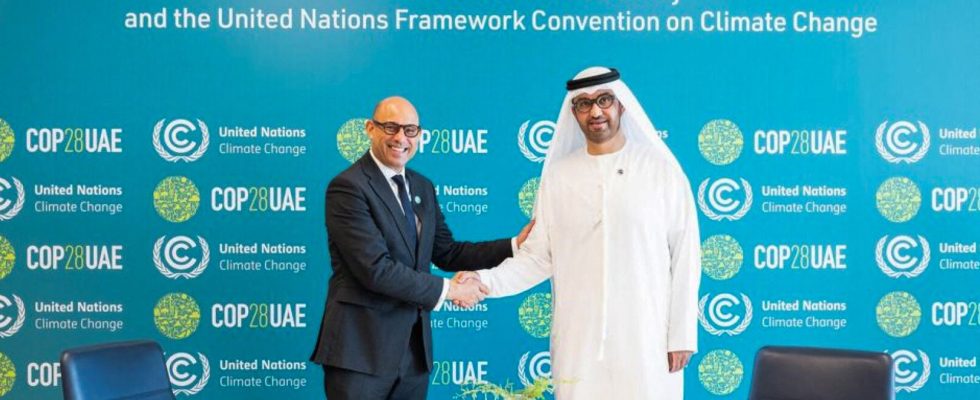It is a leak in the press which comes a little more to question the presidency of the future COP 28 by the United Arab Emirates. The British media The Guardian revealed this Tuesday, August 1 a list of “sensitive subjects” on which the small Persian Gulf state is preparing its communication, particularly in connection with its commitments and its investments in fossil fuels.
The newspaper was thus able to have access to a document presenting the “key messages” that the United Arab Emirates will put forward for the presidency of COP 28. Thus, there is not a single mention of fossil fuels, gas or oil, but it will still be a question of renewable energies and hydrogen. According to the British daily, nothing very surprising: Adnoc, the main state oil company, plans to invest more than 150 billion dollars in gas and oil in the next five years. What to say to the Guardian that “the United Arab Emirates’ hydrocarbon expansion plan is the third in the world with the greatest impact on carbon neutrality”, only surpassed by Saudi Arabia and Qatar.
COP 28 will be held in Dubai from November 30 to December 12. A choice of host country that had surprised, the United Arab Emirates being one of the largest producers of hydrocarbons in the world, and one of the largest emitters of CO2 per capita. Moreover, last January, the appointment of Sultan Ahmed al-Jaber as president of COP 28 aroused the ire of environmental associations. Indeed, the latter is also director of the largest oil company in the Emirati country, Adnoc. A problematic “conflict of interest”, for some.
“The objective is to improve the image of the United Arab Emirates”
According to environmental associations, this expansion in fossil fuels is considered incompatible with the objective of carbon neutrality by 2050. But the United Arab Emirates are already preparing their response. Still according to the revelations of the Guardian, the Emirati government’s communication plan also includes a whole section on the current need to continue to invest in hydrocarbons to meet current global needs. “We cannot put an end to the current energy system before we have built the energy system of tomorrow,” Sultan Ahmed al-Jaber told AFP on July 13.
This leak of documents also reveals several other points about the Emirati presidency of COP 28. Thus, Adnoc has not disclosed its greenhouse gas emissions or published a report on its climate commitments since 2016. The communication strategy of the The emirate’s government is also planning answers on other points than the climate issue, such as war crimes in Yemen, freedom of expression or even rights for homosexuals. “The ultimate goal is to improve the image of their country”, points out Nicholas McGeehan, member of the NGO FairSquare, in the columns of the Guardian.
A “deep concern”
This is not the first time that the Emirati presidency of the future COP 28 has been called into question. On June 7, The Guardianagain, revealed that Adnoc may have had a direct access to e-mails about the organization of COP 28. The state oil company had also been consulted on how to respond to the press, revelations which had angered environmental associations. “It’s an absolute scandal, also declared the insubordinate France MEP Manon Aubry. Having an oil company responsible for coordinating the release of fossils is like asking the tobacco industry to supervise the WHO.” A little earlier in the year, around 100 elected members of the American Congress and the European Parliament had called for the withdrawal of Sultan Ahmed al-Jaber from the presidency of COP 28, expressing their “deep concern” about this mixture of genres.
However, the future president of the climate conference also counts on several supporters. Sultan Ahmed al-Jaber had indeed already led the Emirati delegation to the last COP 27, in Sharm el-Sheikh in Egypt, and also presents himself as the president of the Masdar company, one of the largest in the world in the field of renewable energies. John Kerry, the United States’ special envoy for climate change, called his appointment a “great choice” because “at the head of a company that knows what it needs to do for the transition”. French Economy Minister Bruno Le Maire said last June that we had to “trust” the Gulf States “to provide concrete answers” on the climate issue.
